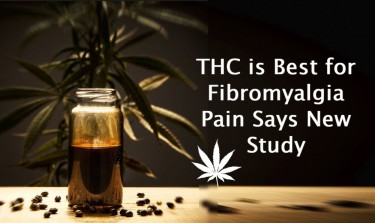
According to the Centers for Disease Control and Prevention, fibromyalgia is a severe illness marked by overall body discomfort, sleep difficulties, tiredness, and emotional anguish. People with fibromyalgia constantly display abnormal pain perception processing. In the United States, this illness affects roughly 4 million grown-ups or about 2 of the adult population. When it comes to effective treatment options, this complicated disease constantly presents difficulties, leaving patients looking for other means of battling their condition.
Growing interest has been shown lately in the implicit use of oral THC remedies for fibromyalgia patients. THC, known colloquially as tetrahydrocannabinol, proudly takes its place among the diverse array of cannabinoids secreted by the cannabis plant. Revered for its distinct psychoactive properties, this wondrous compound has been espoused by experts who claim that harnessing the power of cannabis for medicinal purposes may unlock a trove of therapeutic benefits, extending its healing touch to an expansive gamut of ailments, including fibromyalgia.
State of Fibromyalgia Treatment
The current fibromyalgia treatment options focus on symptom management and constantly combine medication, cognitive behavioral therapy (CBT), and lifestyle changes. However, these approaches may not be effective for everyone, and some individuals experience unwanted side effects or incomplete relief. Given fibromyalgia sufferers' difficulties, interest is growing in the study of complementary therapies such as oral THC. THC has shown potential in preliminary studies and anecdotal evidence for treating fibromyalgia symptoms like pain, exhaustion, and sleep difficulties.
Recent Studies on Oral THC Remedy
Proffers have surfaced suggesting that cannabis could be an indispensable remedial option for treating fibromyalgia. When we claw into the intricate chemical composition of cannabis, we encounter two crucial substances delta-9-tetrahydrocannabinol(THC) and cannabidiol(CBD). These substances have gained considerable attention for their therapeutic properties. Their effects are mediated through the type 1 cannabinoid receptor (CB1), which is expressed in the central nervous system, and the type 2 cannabinoid receptor (CB2), which is expressed in peripheral inflammatory cells.
The use of medical cannabis has been explored in a wide variety of diseases. Presently, the Food and Drug Administration( FDA) has approved the effectiveness of THC in easing nausea and puking caused by chemotherapy and stimulating appetite in cancer-related cases. Also, research has explored the implicit benefits of cannabis, particularly THC, in managing chronic pain disorders such as neuropathic pain and muscle spasticity associated with multiple sclerosis.
Considering the wide use of cannabis and its implicit efficacy in addressing different pain conditions, there is speculation that cannabis may be an effective treatment for fibromyalgia. Accordingly, the ideal of this review is to precisely examine the rearmost clinical data concerning the use of cannabis as a remedial approach for fibromyalgia.
According to newly released data, fibromyalgia patients suffering from pain and fatigue may find relief with oral THC remedies. According to a study conducted by German experts and published in the medical journal Schmerz, THC may be an effective medicinal alternative to the medications currently suggested in various therapy guidelines for people with fibromyalgia.
A sample of 120 fibromyalgia patients was examined in the study by German researchers, with 62 of them undergoing THC remedy. The study concentrated on patients undergoing multimodal, interdisciplinary therapy in the pain ward of a clinic, and they were examined based on the intensity of their pain, several psychometric parameters, and the number of analgesics they consumed while in the clinic. The findings showed that all patient groups saw significant improvements in pain intensity, depression, and general quality of life, with more pronounced changes shown among those receiving THC treatment. In addition, THC use resulted in dosage reductions or the cessation of analgesic drugs in five of the seven groups studied.
Following the legalization of medical cannabis in Germany in 2017, many qualitative studies have examined the effectiveness of medical cannabis, particularly THC, in treating fibromyalgia. This study aimed to dissect THC's efficacy within an interdisciplinary multimodal pain therapy (IMPT) approach by examining its impact on pain and various psychometric variables.
The results of these studies aren't solitary, as other researchers have also brought to light THC's implicit effectiveness in treating fibromyalgia. A Brazilian study conducted in 2020 shed light on the remarkable benefits of THC oil, particularly a THC-rich whole plant extract, in abetting patients with fibromyalgia to manage their symptoms and elevate their overall quality of life.
To conduct this study, a group of 17 women diagnosed with fibromyalgia was named as participants to estimate the efficacy of cannabis oil. The chosen cannabis oil held a high amount of THC and was administered to the subjects for eight weeks. Initially, a single daily drop was the starting dose, with subsequent adaptations grounded on individual symptoms..
The participants were divided into two distinct groups, with one group receiving cannabis oil while the other group entered a placebo. Throughout the eight weeks, five visits were listed to administer the Fibromyalgia Impact Questionnaire (FIQ) both ahead and after the intervention. According to the experimenters," the influence of the intervention on patients' quality of life in the cannabis group was evident, leading to passions of well-being and advanced energy for everyday tasks. Attacks of pain also dropped. "
The low cost and well-tolerated nature of phytocannabinoids were stressed in this randomized controlled trial, suggesting that they can be added as a herbal drug option within the Brazilian public health system to reduce symptoms and enhance the health of fibromyalgia patients.
Since fibromyalgia has a wide range of effects on people, their families, communities, and the healthcare system, it is critical to look at alternative, reasonably priced, and well-tolerated therapeutic modalities. According to this study, using cannabis oil, especially a THC-rich whole plant extract, has the potential to help people with fibromyalgia manage their symptoms and improve their quality of life.
Conclusion
For fibromyalgia patients looking for symptom reduction, oral THC remedy is a feasible option. Although further exploration is demanded, early results indicate that THC may have the capability to reduce pain, improve mood, and enhance the general quality of life. Before considering alternative treatments, patients should speak with healthcare specialists, as with any medical decision.
We can open the door to more effective and personalized ways to treat this chronic illness by continuing to probe the possible advantages of oral THC remedies for fibromyalgia.







